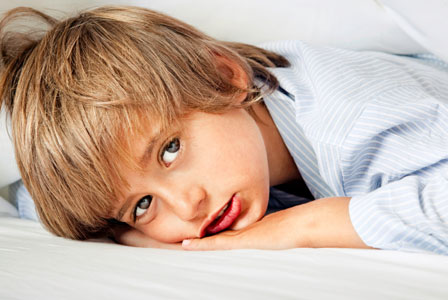
Do you get enough sleep? If you’re raising kids, the answer is probably no. What you might not realize is that your child could be suffering from lack of sleep as well. Learn about the signs of pediatric insomnia and how you can help.
Is your child getting enough sleep?
There’s a reason your child’s pediatrician asks about sleep patterns every time you’re in the office for a visit. Sleep is crucial to a child's development, wellbeing and performance in school.
We talked to Dr. Susanne Bennett, Contributing Editor for Natural Child World Magazine, about pediatric insomnia and what parents can do to help kids get more sleep.
Understand how much sleep your child needs
Before you can evaluate your child’s sleep patterns, find out how much sleep she should be getting. According to Dr. Bennett, kids in elementary school should be getting 10-11 hours of sleep a night. Middle school kids need nine to 10 hours, while high school students need eight to 10 hours. “It is not uncommon for me to hear that some junior and senior students get only seven hours of sleep per day during the school week,” Dr. Bennett says. “This is true sleep deprivation and can be detrimental to physical and emotional health and the immune system.”
Discover 5 fun facts about sleep>>
Recognize the signs of pediatric insomnia
Most kids who aren’t getting enough sleep will show typical signs, such as dark circles, waking up groggy and falling asleep at school or in the car. However, the signs aren’t always that obvious. Dr. Bennett advises that sugar cravings can be a sign of insomnia. Ever seen a child rubbing her eyes before bedtime? Those symptoms may show up all day in a child who needs rest. “Another sign of insomnia is an increase in allergy symptoms,” Dr. Bennett says. “When a child is tired from lack of sleep, their healing process and ability to reduce inflammation is hindered.”
Help your child develop better sleep patterns
If your child isn’t sleeping enough, it’s time to get involved in his sleep habits and lifestyle. Dr. Bennett recommends three healthy meals and two healthy snacks a day. “Keep them away from sugar and starchy foods,” she says. “After homework and dinner, start winding down your child’s nervous system and body by drawing a warm bath.” A consistent wake up time is as important as a consistent bedtime. “Wake your child up at the same time every day, even during the weekends unless they go to bed too late,” advises Dr. Bennett. Don't let kids to play video games or watch TV near bedtime, and avoid having a TV in the bedroom.
Learn how to fix your teen's bad sleep habits>>
Know when to visit your child’s doctor
Sometimes efforts to relieve sleep problems naturally aren’t enough. Children may have serious sleep disorders or other issues hindering sleep. Dr. Bennett suggests that parents seek a doctor’s help when children are falling asleep at school, gaining or losing weight excessively, suffering from emotional or psychological issues or suffering from severe allergy symptoms. “If your child is a teenager, make sure you look deeper into their social lifestyle,” Dr. Bennett says. “They may be experimenting with alcohol or drugs that can affect their sleeping patterns.” Your child’s doctor may recommend further sleep studies and tests to determine the causes of your child’s pediatric insomnia.
More on kids' health
Eat, move, nurture: Raising healthy kids
Natural remedies to cure your kids' colds
Protect your family from the flu